Fleurs du Mal Magazine


.jpg)
Edgar Allan Poe
(1809-1849)
poem
& Gustave Doré
(1832-1883)
illustrations
T H E R A V E N
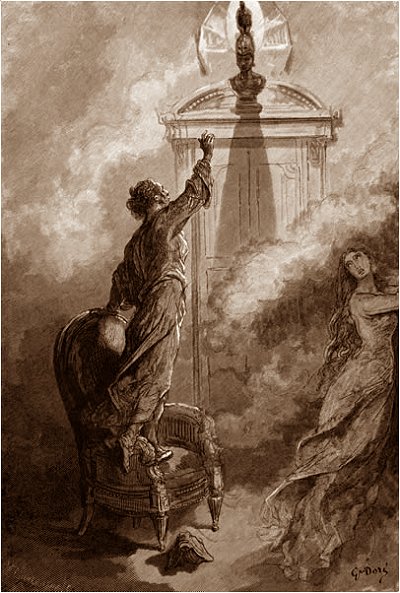
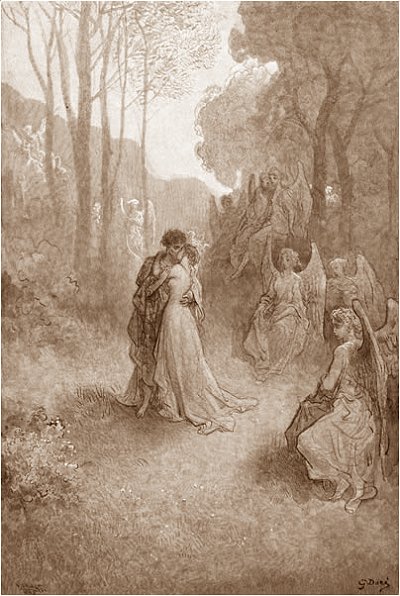
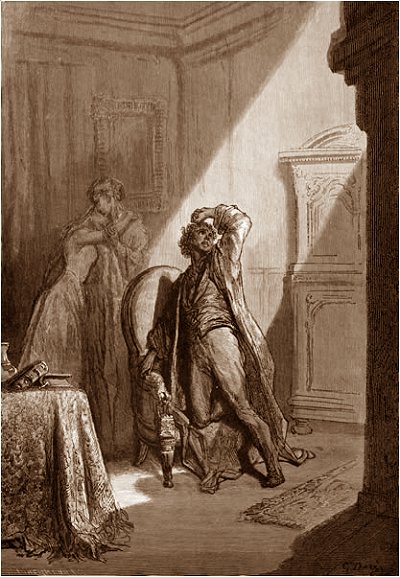
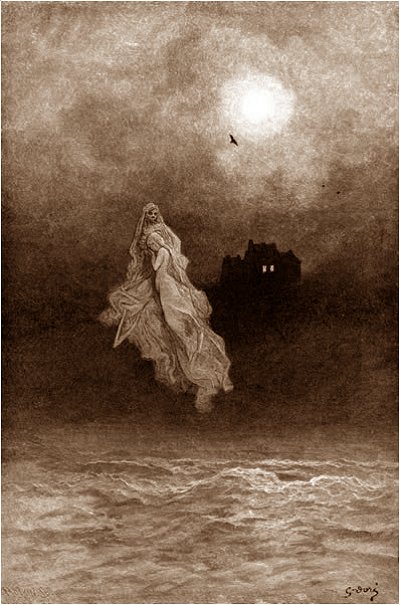
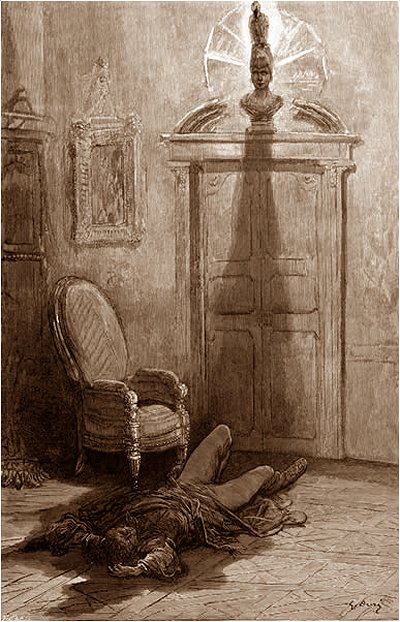

Edgar Allan Poe
The Raven
Once upon a midnight dreary, while I pondered weak and weary,
Over many a quaint and curious volume of forgotten lore,
While I nodded, nearly napping, suddenly there came a tapping,
As of some one gently rapping, rapping at my chamber door.
`’Tis some visitor,’ I muttered, `tapping at my chamber door –
![]() Only this, and nothing more.’
Only this, and nothing more.’
Ah, distinctly I remember it was in the bleak December,
And each separate dying ember wrought its ghost upon the floor.
Eagerly I wished the morrow; – vainly I had sought to borrow
From my books surcease of sorrow – sorrow for the lost Lenore –
For the rare and radiant maiden whom the angels named Lenore –
![]() Nameless here for evermore.
Nameless here for evermore.
And the silken sad uncertain rustling of each purple curtain
Thrilled me – filled me with fantastic terrors never felt before;
So that now, to still the beating of my heart, I stood repeating
`’Tis some visitor entreating entrance at my chamber door –
Some late visitor entreating entrance at my chamber door; –
![]() This it is, and nothing more,’
This it is, and nothing more,’
Presently my heart grew stronger; hesitating then no longer,
`Sir,’ said I, `or Madam, truly your forgiveness I implore;
But the fact is I was napping, and so gently you came rapping,
And so faintly you came tapping, tapping at my chamber door,
That I scarce was sure I heard you’ – here I opened wide the door; –
![]() Darkness there, and nothing more.
Darkness there, and nothing more.
Deep into that darkness peering, long I stood there wondering, fearing,
Doubting, dreaming dreams no mortal ever dared to dream to dream before
But the silence was unbroken, and the darkness gave no token,
And the only word there spoken was the whispered word, `Lenore!’
This I whispered, and an echo murmured back the word, `Lenore!’
![]() Merely this and nothing more.
Merely this and nothing more.
Back into the chamber turning, all my soul within me burning,
Soon again I heard a tapping somewhat louder than before.
`Surely,’ said I, `surely that is something at my window lattice;
Let me see then, what thereat is, and this mystery explore –
Let my heart be still a moment and this mystery explore; –
![]() ‘Tis the wind and nothing more!’
‘Tis the wind and nothing more!’
Open here I flung the shutter, when, with many a flirt and flutter,
In there stepped a stately raven of the saintly days of yore.
Not the least obeisance made he; not an instant stopped or stayed he;
But, with mien of lord or lady, perched above my chamber door –
Perched upon a bust of Pallas just above my chamber door –
![]() Perched, and sat, and nothing more.
Perched, and sat, and nothing more.
Then this ebony bird beguiling my sad fancy into smiling,
By the grave and stern decorum of the countenance it wore,
`Though thy crest be shorn and shaven, thou,’ I said, `art sure no craven.
Ghastly grim and ancient raven wandering from the nightly shore –
Tell me what thy lordly name is on the Night’s Plutonian shore!’
![]() Quoth the raven, `Nevermore.’
Quoth the raven, `Nevermore.’
Much I marvelled this ungainly fowl to hear discourse so plainly,
Though its answer little meaning – little relevancy bore;
For we cannot help agreeing that no living human being
Ever yet was blessed with seeing bird above his chamber door –
Bird or beast above the sculptured bust above his chamber door,
![]() With such name as `Nevermore.’
With such name as `Nevermore.’
But the raven, sitting lonely on the placid bust, spoke only,
That one word, as if his soul in that one word he did outpour.
Nothing further then he uttered – not a feather then he fluttered –
Till I scarcely more than muttered `Other friends have flown before –
On the morrow will he leave me, as my hopes have flown before.’
![]() Then the bird said, `Nevermore.’
Then the bird said, `Nevermore.’
Startled at the stillness broken by reply so aptly spoken,
`Doubtless,’ said I, `what it utters is its only stock and store,
Caught from some unhappy master whom unmerciful disaster
Followed fast and followed faster till his songs one burden bore –
Till the dirges of his hope that melancholy burden bore
![]() Of “Never-nevermore.”‘
Of “Never-nevermore.”‘
But the raven still beguiling all my sad soul into smiling,
Straight I wheeled a cushioned seat in front of bird and bust and door;
Then, upon the velvet sinking, I betook myself to linking
Fancy unto fancy, thinking what this ominous bird of yore –
What this grim, ungainly, gaunt, and ominous bird of yore
![]() Meant in croaking `Nevermore.’
Meant in croaking `Nevermore.’
This I sat engaged in guessing, but no syllable expressing
To the fowl whose fiery eyes now burned into my bosom’s core;
This and more I sat divining, with my head at ease reclining
On the cushion’s velvet violet lining that the lamp-light gloated o’er,
But whose velvet violet lining with the lamo-light gloating o’er,
![]() She shall press, ah, nevermore!
She shall press, ah, nevermore!
Then, methought, the air grew denser, perfumed from an unseen censer
Swung by angels whose faint foot-falls tinkled on the tufted floor.
`Wretch,’ I cried, `thy God hath lent thee – by these angels he has sent thee
Respite – respite and nepenthe from tha memories of Lenore!
Quaff, oh quaff this kind nepenthe, and forget this lost Lenore!’
![]() Quoth the raven, `Nevermore.’
Quoth the raven, `Nevermore.’
`Prophet!’ said I, `thing of evil! – prophet still, if bird or devil! –
Whether tempter sent, or whether tempest tossed thee here ashore,
Desolate yet all undaunted, on this desert land enchanted –
On this home by horror haunted – tell me truly, I implore –
Is there – is there balm in Gilead? – tell me – tell me, I implore!’
![]() Quoth the raven, `Nevermore.’
Quoth the raven, `Nevermore.’
`Prophet!’ said I, `thing of evil! – prophet still, if bird or devil!
By that Heaven that bends above us – by that God we both adore –
Tell this soul with sorrow laden if, within the distant Aidenn,
It shall clasp a sainted maiden whom the angels named Lenore –
Clasp a rare and radiant maiden, whom the angels named Lenore?’
![]() Quoth the raven, `Nevermore.’
Quoth the raven, `Nevermore.’
`Be that word our sign of parting, bird or fiend!’ I shrieked upstarting –
`Get thee back into the tempest and the Night’s Plutonian shore!
Leave no black plume as a token of that lie thy soul hath spoken!
Leave my loneliness unbroken! – quit the bust above my door!
Take thy beak from out my heart, and take tha form from off my door!’
![]() Quoth the raven, `Nevermore.’
Quoth the raven, `Nevermore.’
And the raven, never flitting, still is sitting, still is sitting
On the pallid bust of Pallas just above my chamber door;
And his eyes have all the seeming of a demon’s that is dreaming,
And the lamp-light o’er him streaming throws his shadow on the floor;
And my soul from out that shadow that lies floating on the floor
![]() Shall be lifted – nevermore!
Shall be lifted – nevermore!
T H E E N D
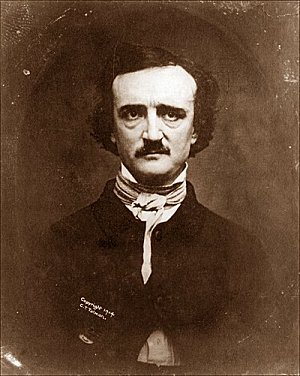
Edgar Allan Poe

Gustave Doré
Edgar Allan Poe & Gustave Doré
The Raven part II
fleursdumal.nl digital magazine
More in: Department of Ravens & Crows, Illustrators, Illustration, Poe, Edgar Allan
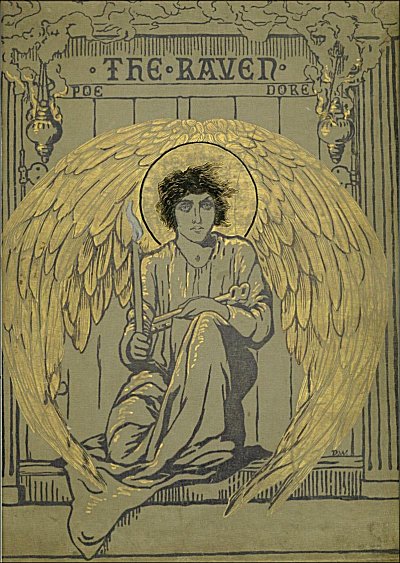
Edgar Allan Poe
(1809-1849)
& Gustave Doré
(1832-1883)
T H E R A V E N
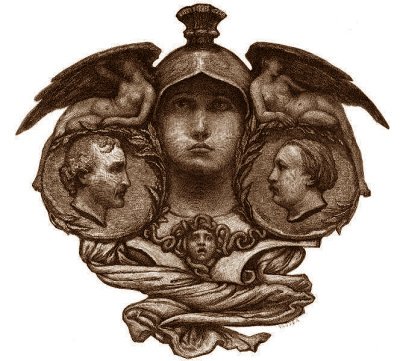

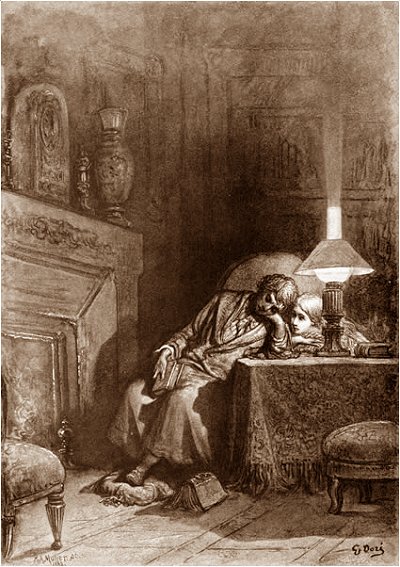

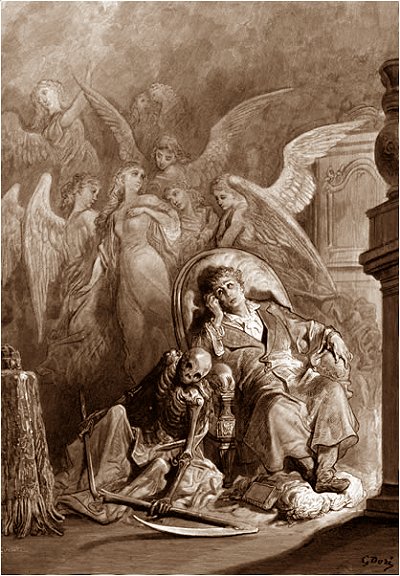
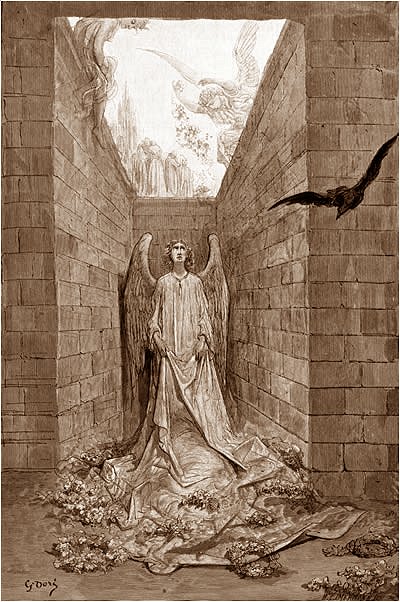
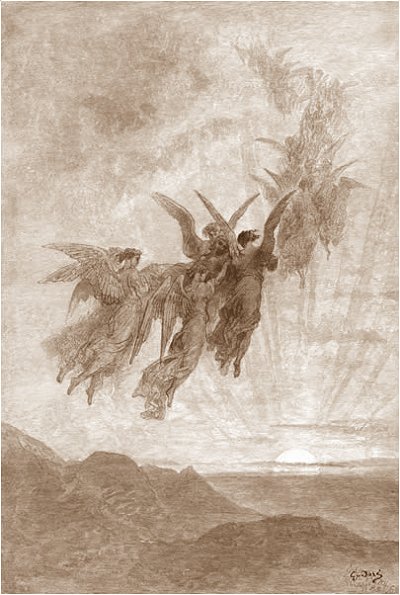
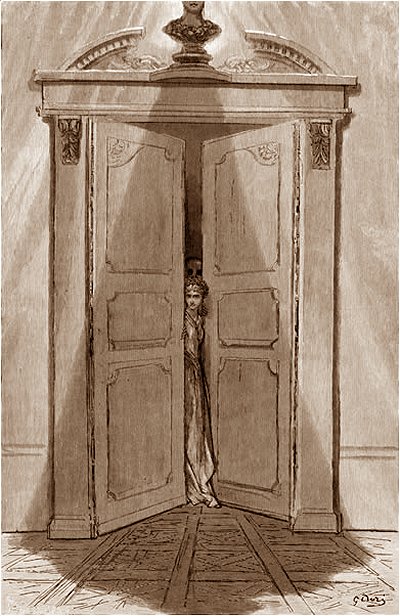
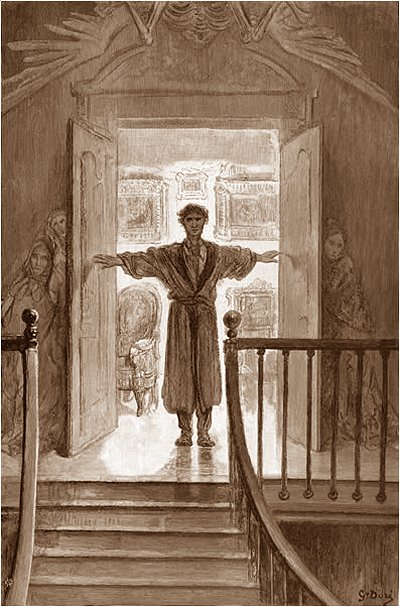
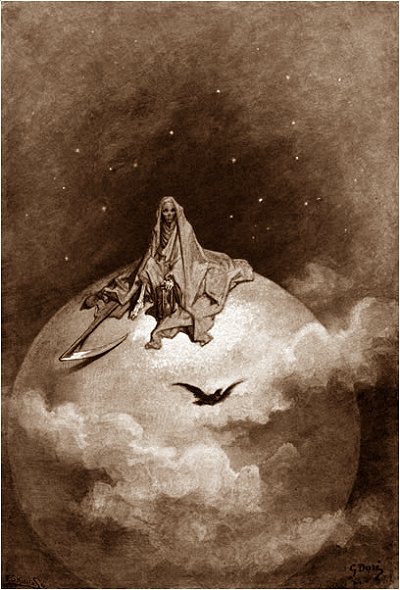
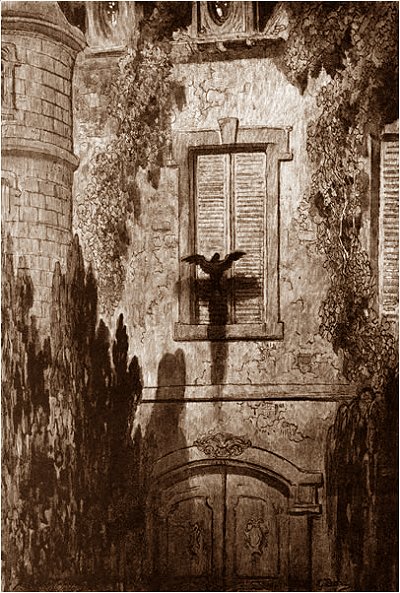
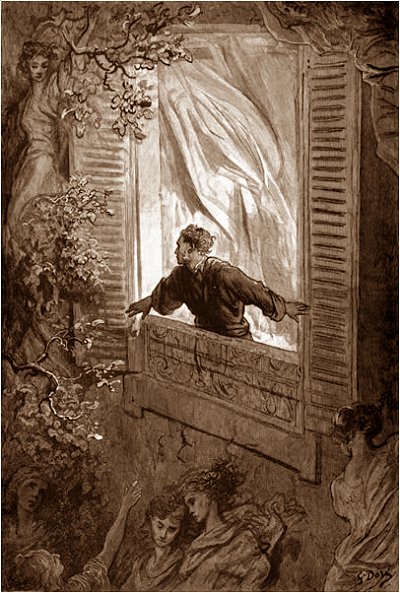
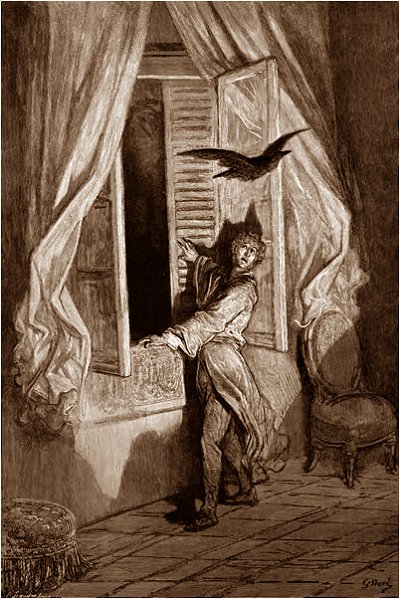
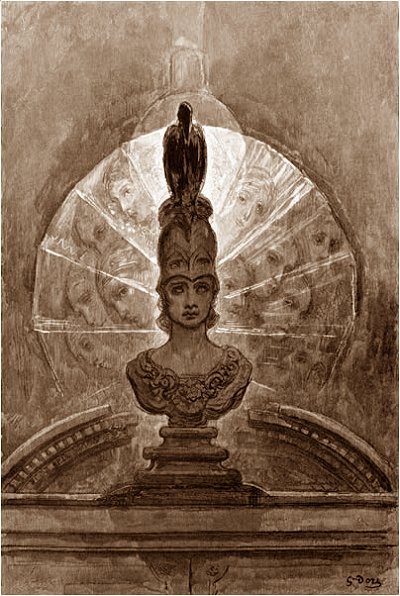
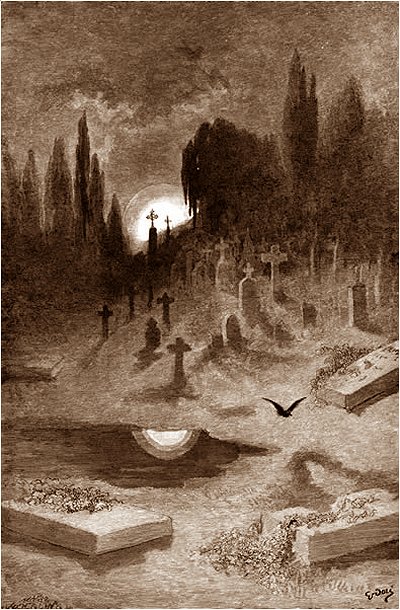
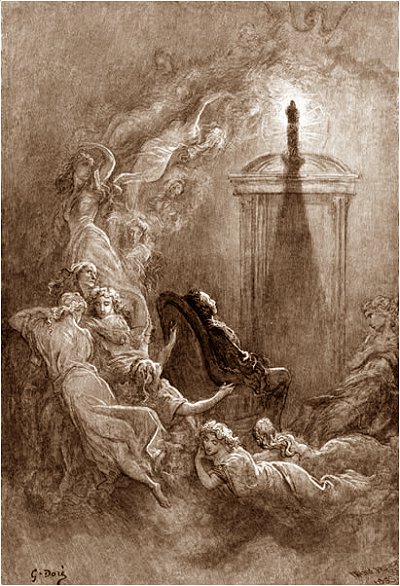
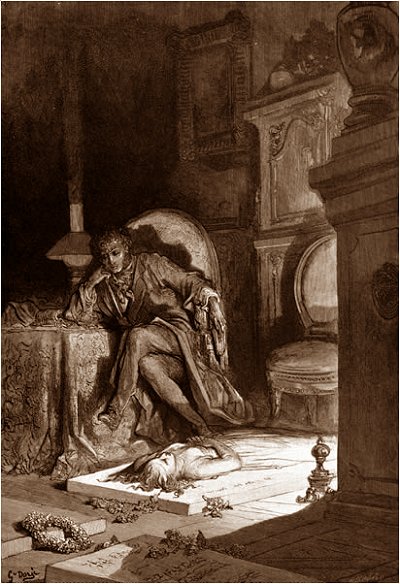

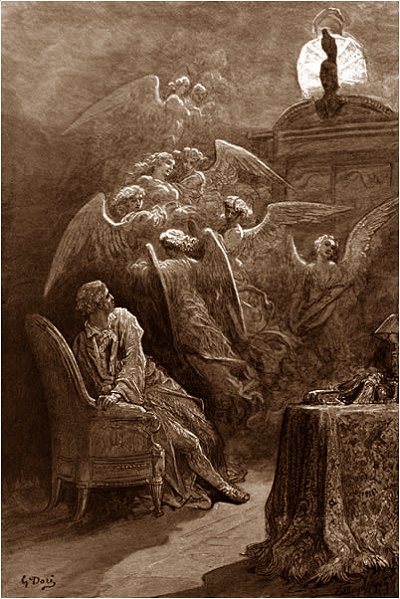
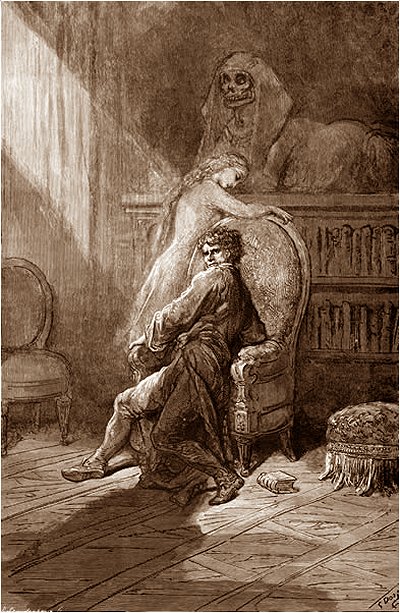
Edgar Allan Poe & Gustave Doré:
The Raven – part I
kempis poetry magazine
More in: Department of Ravens & Crows, Poe, Edgar Allan
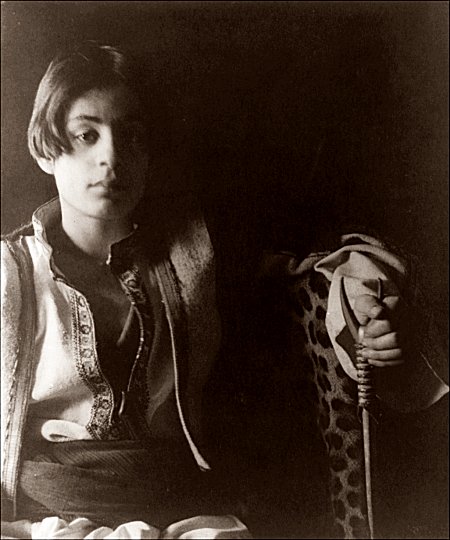
K h a l i l G i b r a n
(1883 – 1931)
A Poet’s Death is His Life
The dark wings of night enfolded the city upon which Nature had spread a pure white garment of snow; and men deserted the streets for their houses in search of warmth, while the north wind probed in contemplation of laying waste the gardens. There in the suburb stood an old hut heavily laden with snow and on the verge of falling. In a dark recess of that hovel was a poor bed in which a dying youth was lying, staring at the dim light of his oil lamp, made to flicker by the entering winds. He a man in the spring of life who foresaw fully that the peaceful hour of freeing himself from the clutches of life was fast nearing. He was awaiting Death’s visit gratefully, and upon his pale face appeared the dawn of hope; and on his lops a sorrowful smile; and in his eyes forgiveness.
He was poet perishing from hunger in the city of living rich. He was placed in the earthly world to enliven the heart of man with his beautiful and profound sayings. He as noble soul, sent by the Goddess of Understanding to soothe and make gentle the human spirit. But alas! He gladly bade the cold earth farewell without receiving a smile from its strange occupants.
He was breathing his last and had no one at his bedside save the oil lamp, his only companion, and some parchments upon which he had inscribed his heart’s feeling. As he salvaged the remnants of his withering strength he lifted his hands heavenward; he moved his eyes hopelessly, as if wanting to penetrate the ceiling in order to see the stars from behind the veil clouds.
And he said, “Come, oh beautiful Death; my soul is longing for you. Come close to me and unfasten the irons life, for I am weary of dragging them. Come, oh sweet Death, and deliver me from my neighbors who looked upon me as a stranger because I interpret to them the language of the angels. Hurry, oh peaceful Death, and carry me from these multitudes who left me in the dark corner of oblivion because I do not bleed the weak as they do. Come, oh gentle Death, and enfold me under your white wings, for my fellowmen are not in want of me. Embrace me, oh Death, full of love and mercy; let your lips touch my lips which never tasted a mother’s kiss, not touched a sister’s cheeks, not caresses a sweetheart’s fingertips. Come and take me, by beloved Death.”
Then, at the bedside of the dying poet appeared an angel who possessed a supernatural and divine beauty, holding in her hand a wreath of lilies. She embraced him and closed his eyes so he could see no more, except with the eye of his spirit. She impressed a deep and long and gently withdrawn kiss that left and eternal smile of fulfillment upon his lips. Then the hovel became empty and nothing was lest save parchments and papers which the poet had strewn with bitter futility.
Hundreds of years later, when the people of the city arose from the diseases slumber of ignorance and saw the dawn of knowledge, they erected a monument in the most beautiful garden of the city and celebrated a feast every year in honor of that poet, whose writings had freed them. Oh, how cruel is man’s ignorance!
Khalil Gibran
A Poet’s Death is His Life IV
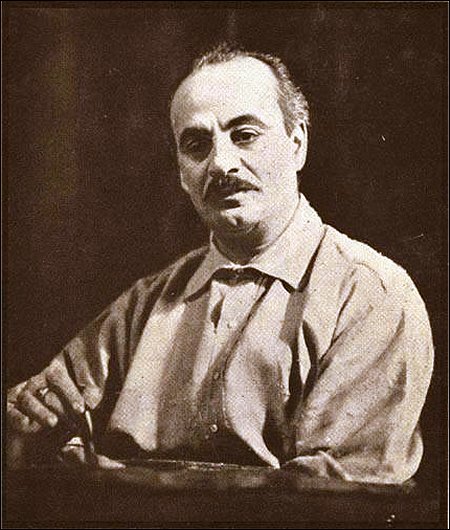
fleursdumal.nl magazine
More in: Archive G-H, Gibran, Khalil
Thank you for reading Fleurs du Mal - magazine for art & literature